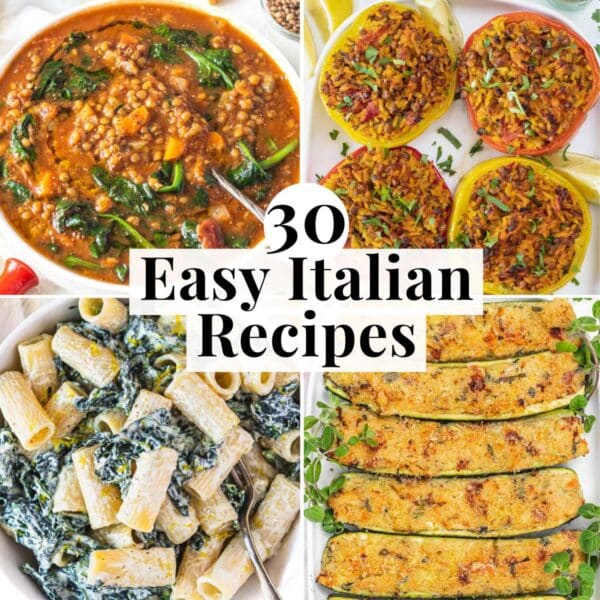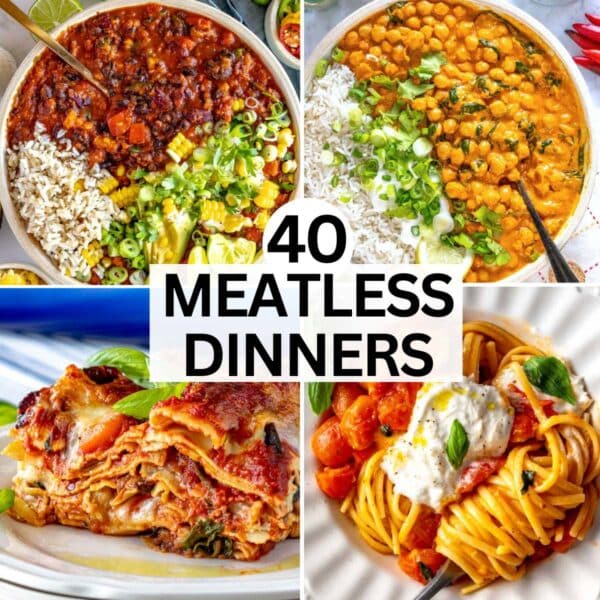Warming, versatile, and comforting, polenta is a creamy and satisfying Italian dish made with cornmeal cooked in boiling water.
It has a mild corn flavor and is an excellent blank canvas for your favorite sauces and toppings.
It’s divine with lentil bolognese, sautéed mushrooms, or mushroom ragu, or you can make delicious polenta fries and lasagna.

What is polenta?
Polenta is a traditional Italian dish that, in the past, was made with barley, farro, buckwheat, or rye flour.
A few years after the discovery of the Americas in the 16th century, corn was imported for the first time to Italy, and people started cooking with corn grits.

Since then, creamy yellow cornmeal polenta has become the most common type and replaced the other varieties.
You’ll love it because it’s easy to make, has a smooth, creamy texture, and has a comforting mild corn flavor that will vaguely remind you of cornbread or corn tortillas.

Most importantly, it is incredibly versatile. Like pasta, you can serve it with your favorite sauces and toppings.
We recommend it with our lentil bolognese or mushroom ragu.
But it’s also delicious as polenta fries cooked in the air fryer or polenta lasagna with sautéed mushrooms, sautéed kale, and cheese.
Ingredients for polenta

Quantities are in the recipe box at the bottom of the page.
Cornmeal
There are two main types of corn grits/cornmeal for polenta in the stores:
- Polenta from coarsely stone-ground cornmeal requires 40 to 60 minutes of boiling.
- Quick cooking polenta from finer cornmeal requires 5 minutes of boiling time.
If you want to make a quick weeknight dinner, we recommend using quick-cooking polenta.
Bob’s Red Mill, Colavita, and other brands sell excellent instant-cooking corn grits ready in 5 minutes.
Water
Traditionally, the cornmeal is cooked in lightly salted water.
Substitute vegetable broth to make a more flavorful dish. You can also use half water and half milk.
Add-ins
Cheeses of all kinds are the most common additions to polenta.
If you are vegan, you can add non-dairy cheese.
If you’re not vegan, experiment with your favorite cheeses.
Some cheeses that go well with this recipe are toma, gorgonzola, fontina, asiago, Swiss cheese, gruyere, provolone and of course parmigiano and pecorino.
Sometimes, extra virgin olive oil is added to the cornmeal as it simmers, and butter is often used as a topping.

How to make creamy polenta
Water ratio: We recommend 3 to 4 cups of water for 1 cup of polenta. If your cornmeal absorbs more water or you like a thinner consistency, stir in more water.
Which pot to use? It’s best to use a pot with a heavy bottom, as it distributes the heat more evenly and prevents the polenta from sticking. We recommend enameled cast iron.
Bring the water or broth to a boil and add the salt.
Remove the pot from the heat and slowly add the cornmeal, 1/4 cup at a time, to the hot water while stirring with a whisk.
Bring the pot back to the stovetop and simmer on medium-low heat while whisking for 3 to 5 minutes or as instructed on the cornmeal package.

As the corn grits thicken, you might want to switch from a whisk to a wooden spoon to make the stirring easier.
If the polenta gets too thick for your taste, add more water. Different cornmeal brands may require more or less water.

Taste to make sure it’s ready. Careful, it’s piping hot! You can also adjust for salt. The texture should be smooth and creamy.
The consistency depends on your preference and can be more or less thick. We like a medium consistency spoonable on a plate, almost like a risotto or mashed potatoes.
But most traditionalists prefer thicker polenta, served almost solid on a cutting board and cut with a knife or kitchen twine.

Serving Suggestions
Polenta has a fairly neutral flavor. Think of it as pasta, and serve it as a main dish with a sauce or a plain as a side dish.
To top it, spread it on a plate first, creating a well in the center.
The most basic version is topped with grated parmesan, butter, and other cheese like provolone, gorgonzola, or fontina.

You’ll also love it with our earthy lentil bolognese, herby Tuscan bean stew, and rich mushroom ragu. It’s the perfect winter weeknight meal.
Quick polenta takes 5 minutes, and you can make the sauce beforehand. It’s cozy, wholesome, deeply satisfying, and so tasty!

Variations
Cheese Polenta
Cheese polenta, or “polenta concia,” is a recipe from the northernmost part of Italy, in the mountain areas.
Cook the cornmeal as instructed, then turn the heat off. Add diced or grated cheese and stir until the cheese melts.

Serve on a plate with butter, more cheese, and freshly ground black pepper.
Traditionally, toma cheese and fontina cheese are added. Since those are hard to find outside of Italy, you can add your favorite cheese.
We recommend gorgonzola, provolone, Swiss cheese, parmesan, cheddar, and Monterey Jack. Avoid mozzarella, as it can get stringy.

What to do with polenta leftovers?
You can turn your leftover polenta into delicious polenta fries. We cook them in the air fryer with olive oil and rosemary.
They are crunchy outside and tender inside. Here’s the full recipe for polenta fries (coming soon).

Alternatively, you can make a delicious polenta lasagna. This one’s so good you can customize it with your favorite fillings.
We make it with layers of polenta stuffed with flavorful cheeses, sautéed mushrooms, and roasted chestnuts, but you can use sauteéd kale instead.
Here’s our recipe for polenta lasagna (coming soon).

Storage
Refrigerator: Keep leftovers in an airtight container for 4 days. You can reheat it in the microwave.
Alternatively, add it to a casserole dish with cheese, veggies, and sauce and bake for 20 minutes at 350°F or 180°C.
Similar recipes
COOKING BASICS: couscous, quinoa, how to cook chickpeas, how to cook dried lentils, barley, focaccia, tofu, roasted chestnuts.
ITALIAN RECIPES: mushroom risotto, schiacciata, lentil soup, broccoli pasta, vegetarian lasagna, gnocchi alla sorrentina, minestrone soup.

Polenta
Ingredients
- 1 cup polenta we recommend quick-cooking.
- 3 cups water + 1 cup if necessary. Substitute vegetable broth.
- ½ teaspoon sea salt or more to taste
- 1 tablespoon extra virgin olive oil optional
Instructions
- In a medium-size pot with a heavy bottom, bring 3 cups water to a boil and add ½ teaspoon sea salt.Remove the pot from the heat and slowly add 1 cup polenta, 1/4 cup at a time, while stirring with a whisk. Optionally, stir in 1 tablespoon extra virgin olive oil.Bring the pot back to the stovetop and simmer on medium-low heat while whisking for 5 minutes or as instructed on the package.
- As the polenta thickens, you might want to switch from a whisk to a wooden spoon to make the stirring easier.If the polenta gets too thick you can add more water. Different cornmeal brands may require more or less water.
- Taste the polenta to make sure it’s ready. Careful, it’s piping hot! You can also adjust for salt. The texture should be smooth and creamy.You can serve it as a main with parmesan, butter, and other cheeses, top it with your favorite sauce, or serve it as a side dish.
Notes
- Polenta from coarsely stone-ground cornmeal requires 40 to 60 minutes of boiling.
- Quick cooking polenta from finer cornmeal requires 5 minutes of boiling time.













So stinking good!!!!
I had mine with vegan Parmesan cheese, olive oil, avocado, rosemary!
Then leftovers were slightly fried and eaten with sauté garlic and onions
Hi guys, love the simple overview and structured writing. With these tips I will make polenta for my family next weekend. Cheers